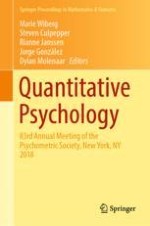2019 | OriginalPaper | Buchkapitel
NUTS for Mixture IRT Models
verfasst von : Rehab Al Hakmani, Yanyan Sheng
Erschienen in: Quantitative Psychology
Aktivieren Sie unsere intelligente Suche, um passende Fachinhalte oder Patente zu finden.
Wählen Sie Textabschnitte aus um mit Künstlicher Intelligenz passenden Patente zu finden. powered by
Markieren Sie Textabschnitte, um KI-gestützt weitere passende Inhalte zu finden. powered by
